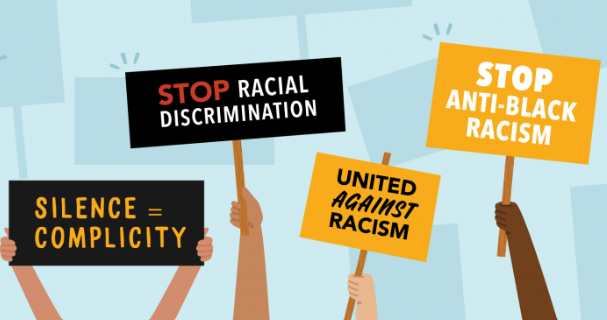On Saturday August 26, a white man killed three Black people in a racially motivated attack in Jacksonville, Florida. The Justice Department is investigating the shooting as a hate crime and an act of racially motivated violent extremism.
FBI data from March 2023 shows an alarming rise in violent attacks against communities made vulnerable by continued racist rhetoric and policies in the U.S. Although FBI data is known to be incomplete because many hate crimes are unreported and hate crime definitions vary, it remains an important indicator of hate crime trends. Recent reports show:
- Reported hate crimes rose by more than 11% from 2020 to 2021.
- Hate crimes against Asian Americans and Pacific Islanders, Sikhs and LGBTQ people saw some of the highest increases during that year: for example, hate crimes against Asians more than doubled.
- Hate crimes toward Black Americans increased 14% in 2021 compared to 2020 and had increased 49% percent from 2020 compared to 2019.
- Hate crimes against Black people, though increasing by a smaller percentage than hate crimes against some other groups, remained by far the largest category making up nearly one-third of reported hate crime incidents in 2021.
The Advocacy Center is committed to working with the communities and governing bodies of Tompkins County to co-develop interventions and policies that align with community strengths and needs and which use community-led and evidence-informed solutions to ensure that Black, Indigenous, and People of Color (BIPOC) live in a society that is just, equitable, and free of racism, xenophobia, harassment, mass shootings, and violent extremism.
We encourage white people to actively engage in anti-racism learning and practices.
Please consider contributing to one or more of the Tompkins County organizations listed by the Community Foundation: https://www.cftompkins.org/resources/social-justice/
Local organizations to join and/or contact for training opportunities listed on the same page: https://www.cftompkins.org/resources/social-justice/
Free, online Bystander Intervention workshops offered by Right to Be
Learn about history behind today’s current events and politics: Heather Cox Richardson Letters from an American
Resources on Raising Anti-Racist Children from Trying Together in Pennsylvania
14 Antiracist Books for Kids and Teens Recommended by BIPOC Teachers and Librarians by Jackie Reeve, NYTimes Wirecutter, 2020
Anti-Racist Resource Guide developed by the New York State Coalition Against Domestic Violence for white people to deepen their anti-racism work includes organizations, articles, podcasts, videos, books, films, and resources for parents
Also from the New York State Coalition Against Domestic Violence Dismantling Oppression Toolkit:
- Addressing Systemic Racism in the Anti-Violence Movement Texas Association Against Sexual Assault (TAASA) compiled resources to acknowledge Black activism in the anti-sexual violence movement, encourage reflection about organizational cultures and practices to cease perpetuating harms, and move toward eradicating anti-blackness and other root causes of sexual violence.
- Actualizing Racial Equity in the field of domestic violence prevention. Keynote presentation by Jacqueline Miller from the National Resource Center on Domestic Violence at the NYSCADV and NYSCASA 2022 Violence Prevention Summit. “Dismantling anti-Blackness where it shows up in our personal and professional spaces is a specific and integral part of racial justice work.” Miller’s presentation highlights promising practices, tools, and resources violence preventionists and movement leaders can use to center, uplift and support Black and Brown survivors, advocates and communities. Miller’s plenary presentation was followed by a recorded workshop in which she shares more about NRCDV’s Journey toward becoming an antiracist organization and gives participants /viewers a clear understanding of key concepts such as racial justice, equity, anti-oppression work and structural racism; strategies for advancing racial equity in their work; ways to facilitate meaningful conversations about race and advance racial justice work.
